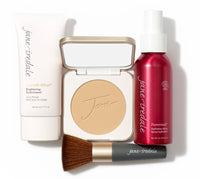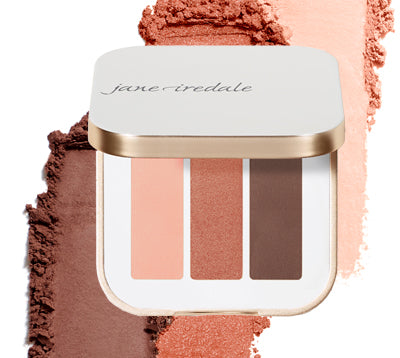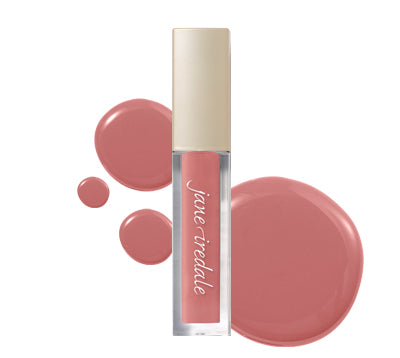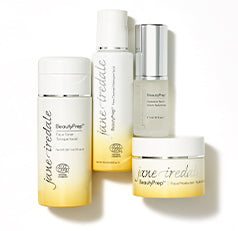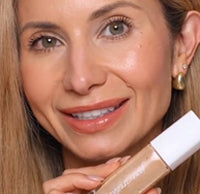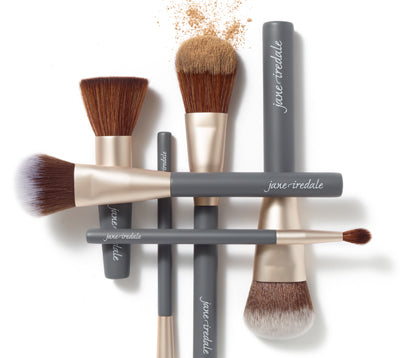
One the most common questions I get from customers is “What color makeupshould I wear?” This can apply to foundation, blush, eyeshadow, lipstick and a variety of makeup products. For most consumers, there’s uncertainty about which colors will go best with their complexion or features. To make matters worse, we now live in a day and age where there are more color options than ever before. The internet is loaded with videos of bloggers and web-stars using rainbow palettesfull of technicolor shadows and blushes. It’s not surprising that we would get overwhelmed. But before you give up your search, let me give you a basic lesson on color theory and the color wheel for makeupthat might simplify the process.
The Basics
To begin, we want to understand our terminology. When we are choosing a makeupcolor, we want to distinguish some qualities about that color. Technically, color has three distinct qualities: Hue, Saturation and Depth.
- Hue is what the actual color is, red, blue, brown etc. When we’re choosing which hue will work best for us, we want to first consider what colors we have in our skin, hair and eyes. For example, people with blond hair and blue eyes tend to look good in gold and brown eyeshadows. If your skin is cool or pink undertone, you’ll probably look good in soft pink blush and lipstick while people with tan skin and brown eyes, look good in grey, silver and blue eyeshadows.
- Saturation is how intense the color is. Highly saturated colors work well for dramatic looks while low saturation colors look softer. For example, for natural looking, daytime pink blush, we want a blush that’s not too saturated. While we typically want a red lipstick worn in the evening to have a lot of saturation. Keep in mind that, just because a color is very saturated doesn’t mean it will be dark. It will just be intense or bright against the tone of your skin.
- Depth, of course, means how light or dark the color is. It’s important to consider the depth of your skin when choosing the depth of your makeup colors. For a color that’s too light may not show up while a color that’s too dark may look more dramatic than you want.
When choosing colors that work well with our features, we typically look at our skin, eyes and hair color to determine what will work best. We have the option of using colors that are similar to our features – Monochromatic, or using colors that are opposite the color of our features – Contrasting. To help us understand, look at the color wheel. Colors on the opposite side of the color wheel are contrasting and colors that match are monochromatic.

Let’s take a closer look at the color wheel for makeup.Historically it was thought that blue eyeshadow would make the eyes look bluer, but in reality, we realized that the pigment of a blue eyeshadow would inevitably be bluer than the eyes thus making the eye look less blue in comparison. We realized that colors like orange, gold and copper are best for contrasting with blue eyes to make themlook bluer in comparison. Likewise, green eyes looks most green when enhanced with purple. Brown eyes have often been confusing since blue is the closest opposite of brown. In reality, a brown eye looks just as beautiful when enhanced with cool colors such as grey, platinum or silver. To learn more about which eyeshadows look best with your eye color, check out How to Choose the Best Eyeshadow for Every Eye Color.
With all of this information stated, it is important to know that you don’t have to wear these colors to make your eyes look good. We’ve found that varying levels of flesh tones, soft browns and neutral taupes look beautiful on most eye colors. For example, I love using our Sweet Spot Eyeshadow Trio, Naturally Matte Kit or Daytime Eyeshadow Kit on any eye color. These are universal palettes.
Correction Before Enhancement
Now that we understand what our color options are we may want to start exploring new colors. But before we go creating our look and choosing the colors that we do want, we must first take a critical look at our face and make sure we’re properly correcting any discoloration we don’t want. I’ve had many clients tell me they can’t wear purple eyeshadow because it brings out their dark circles. My response to that is “what concealer are you using?” If you don’t properly correct dark circles, no shadow will look good. This is another important element to color theory.
If we have discoloration, we don’t need stage makeup or heavy concealer to fix the problem. We work smarter, not harder – with color correcting makeup. If there is redness around your eyes, or in your cheeks, a yellow based concealer like Circle Delete #1 or a yellow based foundation like Warm Sienna will definitely neutralize the redness. If you have grey, blue or purple circles, use a peach concealer like Enlighten 1 or Enlighten Plus to neutralize the darkness. This also works great for hyperpigmentation. You’ll be amazed at how much more easily you can cover the discoloration. Once your skin has an even tone and your dark circles are covered, you’ll be able to choose any blush or eyeshadow color without worrying that you’ll bring out these issues.
If your entire face has a lot of natural redness and you don’t want to try to cover it, then apply a gold-based bronzer like So Bronze 2 or Moonglow to soften then red. Likewise, if your skin is very sallow or gold, try a peach or pink based bronzer like So Bronze 1 or Rose Dawn. These opposing colors can help neutralize your undertone and enhance your complexion.
Dramatic Vs Natural
Another challenge I see consumers face is whether they can get away with dramatic looks or not. So many of us stick to soft, muted and natural looking colors because we think we can’t get away with drama. I can’t tell you how many women I’ve met that have 5 of the same color lipsticks from a bunch of different brands…. forever in pursuit of the perfect pink brown. We wear a color once and get a few compliments and then we think that’s what we’re supposed to wear when in reality, we’re capable of much more diversity than we think. My recommendation is to go up to the lipstick unit, close your eyes, pick a color and wear it for the day. Don’t look at yourself and make comparisons to how you normally look. Look at yourself as if you were a stranger you met on the street. You may surprise yourself! And don’t be afraid to try some red.
Never Alone
We understand that having so many options can be overwhelming but remember that you’re never alone. At jane iredale, we have professional partners all over the world who can color match your skin and recommend a variety of products that will work well with your complexion. And if you don’t want to physically walk into any location, we have a great team of beauty advisors that are available to chat on the phone or on your computer. Don’t hesitate to reach out to us. We hope you’ll have fun exploring your colors!


